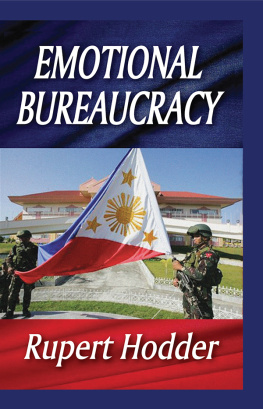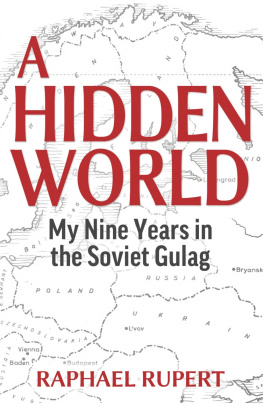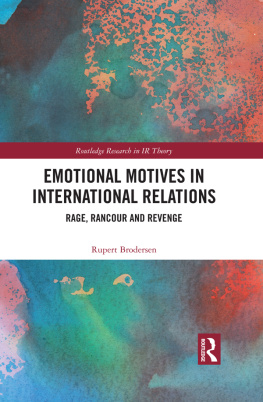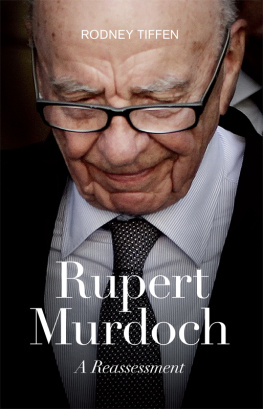EMOTIONAL
BUREAUCRACY
EMOTIONAL
BUREAUCRACY
Rupert Hodder
First published 2011 by Transaction Publishers
Published 2017 by Routledge
2 Park Square, Milton Park, Abingdon, Oxon OX14 4RN
711 Third Avenue, New York, NY 10017, USA
Routledge is an imprint of the Taylor & Francis Group, an informa business
All rights reserved. No part of this book may be reprinted or reproduced or utilised in any form or by any electronic, mechanical, or other means, now known or hereafter invented, including photocopying and recording, or in any information storage or retrieval system, without permission in writing from the publishers.
Notice:
Product or corporate names may be trademarks or registered trademarks, and are used only for identification and explanation without intent to infringe.
Library of Congress Catalog Number: 2010051599
Hodder, Rupert.
Emotional bureaucracy / Rupert Hodder.
p. cm.
Includes bibliographical references and index.
ISBN 978-1-4128-1493-5 (alk. paper)
1. Bureaucracy--Developing countries. 2. Bureaucracy--Psychological aspects. 3. Emotions--Political aspects. 4. Organizational sociology. 5. Developing countries--Politics and government. I. Title.
JF60.H63 2011
302.35--dc22
2010051599
ISBN 13: 978-1-4128-1493-5 (hbk)
Contents
1. Number of Offences and Amounts Involved: By Region
2. Number of Offences and Amounts Involved: By Province
3. Number of Offences and Amounts Involved: By Agency
4. Number of Offences and Amounts Involved: By Position
1. Civil Servants (Career and Non-Career)
2. Political Appointees as a Percentage of the Civil Service
3. Correlations Amongst Scores for Machiavellianism, Self, Others, and Alienation
I Government Employees
II Political Appointees in Provincial Governments
III Political Appointees in City Governments
IV Political Appointees in Municipalities by Region
V Political Appointees by Branch/Agency: National Executive
VI Political Appointees by Branch/Agency: Legislature
VII Political Appointees by Branch/Agency: Judiciary and Constitutional Offices
VIII Scores for Machiavellianism, Self, Others and AlienationCivil Service Commission
IX Correlations Amongst Scores for Machiavellianism, Self, Others, and Alienation (Shift 1) by Agency
X Correlations Amongst Scores for Machiavellianism, Self, Others, and Alienation (Shift 2) by Agency
XI Correlations Amongst Scores for Machiavellianism, Self, Others, and Alienation (Shift 3) by Agency
XII Correlations Amongst Scores for Machiavellianism, Self, Others, and Alienation (Shift 4) by Agency
XIII Association Between Machiavellianism and Authoritarianism
XIV Association Between Machiavellianism and Perceived Quality of Organizations
XV Number of Offences and Amounts Involved: DECS
XVI Numbers of Offences and Amounts Involved: DOF
In the months spent treading the streets of Manila I was met only with kindness and candour. Yet in return all I can doas I must do in a book of this typeis to be fair, and to extend my gratitude, to those who are named (and to those who remain anonymous) in the pages that follow. It is they who made this study possible. I am also indebted to Senator Miriam Defensor Santiago for her trust and invaluable support; to Sandy and Adel for their patience; and to Novelita for her memory, her files, and her shorthand. Special thanks, too, are owed: to Simeon Garcia, Girlie Amarillo, Willie Buenaventura, Mara, and Suharni for all their help and advice; to Neil Roberts and Richard Gibb who gave me the room to work on this; and to Tim, Jamie and Brian for their work on the tables and diagrams.
This book started out as an enquiry into the weakness of the Philippine civil service, but it quickly became an illustrative study of the importance of emotion in effective bureaucracy. Discussions with civil servants and politicians had begun to cast doubt on the Weberian distinction between emotion and a modern bureaucracys impersonal and rational qualities, and led to quite another argument: that deepening emotion, a strengthened sense of the importance of social relationships, and informality are vital to the emergence of professional and stable organizations. Around this argument (which could not be particular to the Philippines) a still broader theme developed: that it is possible to account for social features with reference to actors representations and practices.
Viewed through this perspective, actors and scholars representations (including notions of structure and culture) are necessarily of equal status, and interest is focused on the social worlds surface features rather than on its putative deep or overarching structures (though the possibility that such phenomena exist is not ruled out). Implicit in this thinking is that the general is but a mental devicea way of arranging the particular; and that the world out there must be extraordinarily fuzzy. Strings of representation and practice do form tangible opportunities and constraints; and there are ordered assemblies of strings. Shades of pattern and predictability arise from constant readjustments and compromise as actors seek a working fit with each other, aided by commonalities rooted in the human condition. These commonalities include, most fundamentally, an acute sense of self; a realization of the importance of interactions, relationships and community (upon which representations of self ultimately depend); and an understanding of the need to treat relationships, self, and others as if important in their own right. Yet these patterns of strings are poorly defined and are unable to reproduce themselves. They are better understood as congregations of everyday practicalities and commonalities rather than as closely integrated, large-scale, well-defined, and self-replicating arrangements in thought and behavior; and because they are dimensional, their subsequent influence (especially as constraints and opportunities) is ordinarily both uncertain and unpredictable.
Cast from this substance, bureaucracy is indefinite and ambiguous. Its weaknesses are as much about excessive formality as they are about personalistic behaviour, corruption, and political interference; and enmeshed around these features are other qualitiesprofessionalism, technical competence, imagination, creativity, realistic compromise, commitment, and a willingness to take risks and suffer the consequences. Usually left unrecognised and undeveloped, these qualitiesrooted in deepening emotionkeep the civil service and the organs of government working.
While these ideas are discussed in the context of the Philippines, they have much wider relevance to other statesespecially, but not only, those whose bureaucracies are characterised as weak and personalistic. They suggest that these characteristics, and possible remedies, may need to be reconsidered: that it is through informality and emotion that more effective and stable organizations are built; and that excessive formalism may create the very problems that governments are trying to solve. The kernelsthe means and qualitiesaround which bureaucracies might be strengthened are already in-country and need only be identified and encouraged.














